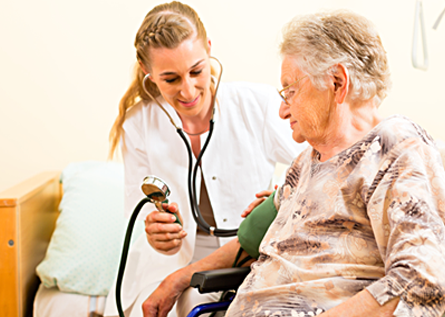NURSING AT HOME

The home nursing service consists of the provision of therapies and assistance at the patient's home. The service is carried out by the nurse, an indispensable figure in hospitals and nursing homes and today more than ever even at home. The increase in the elderly population and chronic diseases linked to age will in fact make hospitals and public (and private) structures less able to manage a large number of patients. The problem depends not only on the shortage of beds, but also on staff. The solution to these "critical issues" is found precisely in the figure of the nursing home, which, by its nature, has nothing to envy to that which operates in hospitals. Indeed, the nurse who comes home must, sometimes, have a preparation superior to that of the hospital colleagues, because committed to assist the patient not only from the therapeutic and family point of view, but also relational and human. If nurses in hospitals are limited to executing the orders of doctors, those at home must not only comply with the prescriptions of doctors, but also educate the patient and his family to a better management of the therapy and the disease.
In this context, four areas of intervention are distinguished, namely: prevention, care, rehabilitation and education, interventions that in turn include three important aspects: technical, relational and educational. From a technical point of view, nursing interventions aim to ensure the correct application and administration of the therapies prescribed by the doctor, but also the execution of all the mechanical and manual interventions necessary for the patient to improve their quality of life with respect to the disease and therefore : medications, application of catheters, drip, infusions, probes, management of ostomy and urostomy, cleaning of surgical wounds and bedsores. From a relational point of view, nursing home interventions must also provide for a communication modality aimed at creating an atmosphere of humanity, empathy and cordiality with the patient and his family members. In fact, the human relationship between the nurse, the assisted patient and his home entourage makes it possible to face the painful and difficult experience of the disease more serenely. From an educational point of view, the home nurse must be able to explain, to the patient and his family, the methods of application of the aids and medical-surgical devices and the administration of the drugs entrusted to the same family members, also providing support in the bureaucratic management for the request of therapeutic devices.
In case of long chronic diseases, terminal or neurodegenerative, the home nurse must be able to cope with the most serious and unpredictable situations, often also related to the type of pathology of the patient. Moreover, this operator must be able to treat, from a health, practical and human point of view, even patients forced to total immobility, involving the family in a communication and comparison with the patient and his needs. During their intervention, nurses at home must know how to interact with other figures useful for the assistance of the patient, such as caregivers. Many times, just for the good of the patient, the nurses themselves are called to identify the signs of discomfort within family relationships and the social and economic problems that can put the environment of the assisted person at risk.
Precisely because of the important social and health role, home nursing services (inserting links with a written article on nursing services) are also foreseen by the World Health Organization. Home nursing care is also offered by Pharmamedic, which makes it available. of all users (affiliated and not) to improve their quality of life. The service is coordinated by the Operations Center and is carried out by our operators, all qualified in the assistance and care of users who rely on their professionalism every day.

